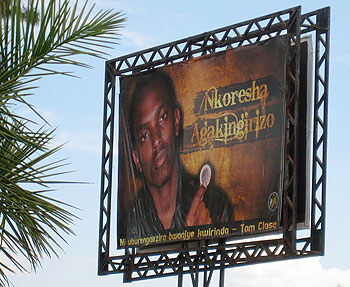The perception of condom use in villages is varies among individuals. Several rural dwellers view the use of condoms as an unnecessary burden; this probably explains the huge families and lack of spacing between children. However, the challenge lies in changing mindsets, availing condoms and sensitization on condom use as a means of family planning and HIV/AIDS prevention. According to the 2008 Demographic and Health Survey, the HIV prevalence rate in Rwanda is estimated at 3.1 percent.


The perception of condom use in villages is varies among individuals. Several rural dwellers view the use of condoms as an unnecessary burden; this probably explains the huge families and lack of spacing between children. However, the challenge lies in changing mindsets, availing condoms and sensitization on condom use as a means of family planning and HIV/AIDS prevention.
According to the 2008 Demographic and Health Survey, the HIV prevalence rate in Rwanda is estimated at 3.1 percent.
Donath Niyigaba, 45 years, from Gakenke district is married with five children. He says what matters most in the fight against HIV/AIDS, is trust between spouses.
"I trust my wife and there is no need of using a condom because I ‘fear’ to catch some disease,” Niyigaba says.
However, he says the youth who want to migrate to big cities, should use condoms, but should still endeavor to abstain.
"I never had sex before I got married but today you hear cases of children at the age of 16 giving birth or men as old as me, raping their own children, it is absurd!” Niyigaba says as he nods his head.
Elias Rugamba, 27 years, has only lived for six months in Kigali city. He says the idea of talking openly about condoms is strange.
"Our mudugudu (village) leader used to sensitize the youth about using condoms but it was hard for me and my fellows to get them. However, after telling us about the negative side of having unprotected sex I had to adapt to the idea and system for safety,” Rugamba said.
Rugamba confessed that he previously had misconceptions about condom use. These were developed over time by rumors and conversations he had from people in his village.
"My friend who had come from the city told me that when you use a condom you don’t enjoy sex so I believed it as a reality. But after being sensitized I had felt that I had the freedom and option but to use it,” Rugamba explains.
A Nyarugenge businessman names Kalisa, and a former fisherman since the 1990s, said he used to have colleagues who shared condoms back in the day.
"I am still wondering if this was the right way to protect themselves from HIV,” he says.
"We used not to have visitors who are female and if anyone had a chance to get one, they ran and got a condom from friends, But these condoms were already used,” he recalls, adding that, "We would wash, boil and dry them, then keep them in our houses so that whoever might need it can find it clean.”
"It’s only God that protected us otherwise I don’t think I can ever repeat the same mistake today because I can afford to buy new ones and dispose them off after,” Kalisa says.
Kalisa encourages people, especially those deep in the villages to avoid this habit since it is dangerous.
mbbz_pelagie@yahoo.com


